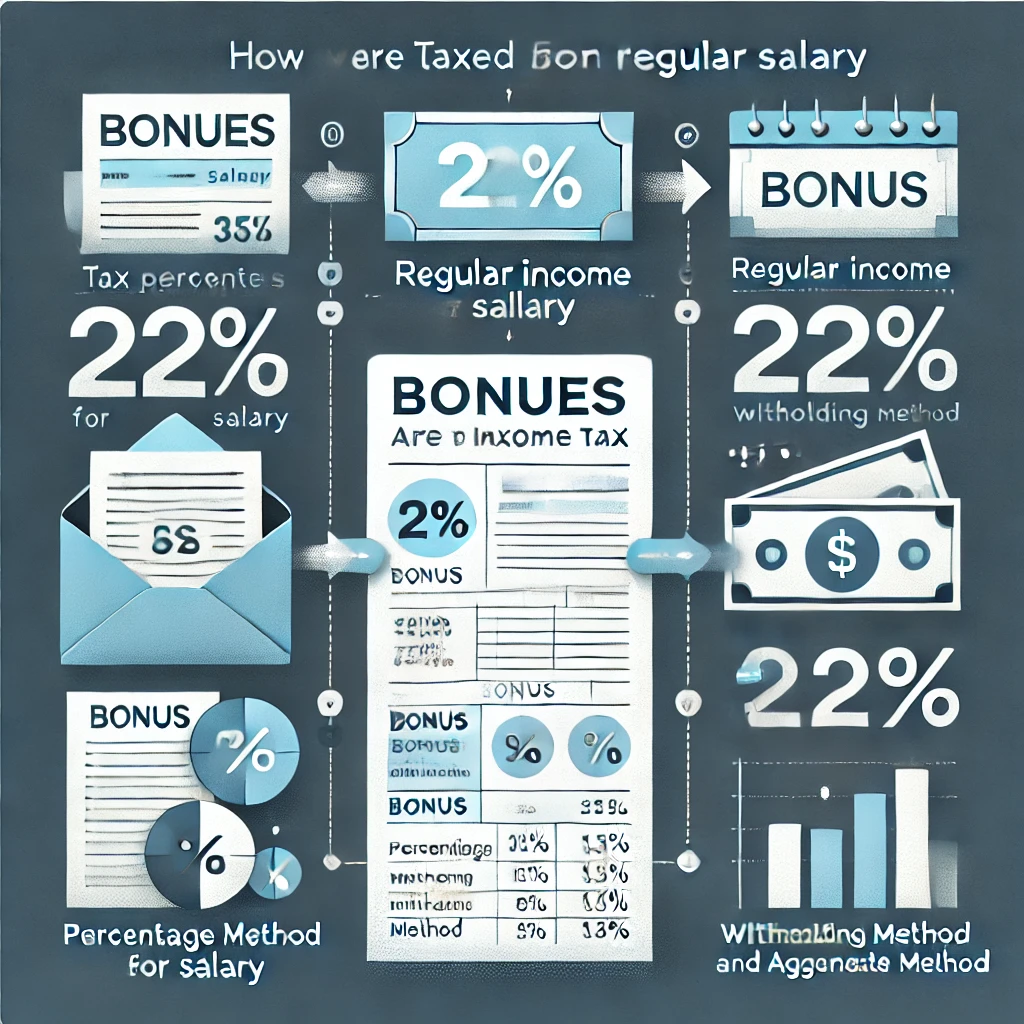
Introduction
Bonuses are a great incentive, often used by employers to reward hard work and dedication. However, many employees believe that bonuses are taxed at a higher rate than their regular salary. This misconception can lead to frustration when they see a significant portion of their bonus withheld for taxes. But is it really true that bonuses are taxed more than salary? In this article, we’ll break down how bonus taxation works, clarify common misunderstandings, and help you understand what to expect when you receive a bonus.
How Are Bonuses Taxed?
Bonuses are considered supplemental income by the IRS, meaning they are subject to different withholding methods compared to regular salary. However, this does not necessarily mean they are taxed more overall.
Two Ways Bonuses Are Taxed
The IRS allows employers to withhold taxes on bonuses using one of two methods:
1. Percentage Method
- The most common approach for bonus taxation.
- A flat 22% federal tax withholding is applied to bonuses under $1 million.
- For bonuses exceeding $1 million, any amount above $1 million is taxed at 37%.
- This rate applies regardless of your normal tax bracket.
2. Aggregate Method
- The bonus is added to your most recent paycheck.
- The combined amount is taxed based on your W-4 tax withholding settings.
- This method can result in higher initial withholdings, making it seem like your bonus is taxed more heavily.
Why Do Bonuses Seem to Be Taxed More?
There are a few reasons why people think bonuses are taxed at a higher rate than salary:
1. Higher Initial Withholding
- The 22% flat rate (or higher for large bonuses) may be higher than your normal tax rate, leading to a perception that more tax is being taken.
- If your employer uses the aggregate method, it could push your income into a higher tax bracket temporarily, leading to increased withholding.
2. Payroll Deductions and Other Taxes
- Social Security and Medicare taxes (FICA) apply to both salary and bonuses at the same rate (6.2% for Social Security and 1.45% for Medicare).
- If your total income surpasses $200,000 ($250,000 for married couples filing jointly), an additional 0.9% Medicare tax applies.
3. Misunderstanding Withholding vs. Final Tax Liability
- Withholding is not the same as your final tax rate.
- Any excess withholding on your bonus will be refunded when you file your tax return.
How to Minimize Bonus Tax Withholding
While you can’t avoid paying taxes on your bonus, you can take steps to reduce the impact of high withholding rates:
1. Adjust Your W-4 Withholding
- If your employer uses the aggregate method, increasing your exemptions can reduce excess withholding.
- Make sure your W-4 accurately reflects your tax situation.
2. Contribute to Tax-Advantaged Accounts
- 401(k) Contributions: Redirect part of your bonus into a 401(k) to reduce taxable income.
- Health Savings Account (HSA): If eligible, contribute to an HSA to lower taxable wages.
- IRA Contributions: Consider contributing to a traditional IRA for additional tax deferral.
3. Receive Your Bonus Differently
- Ask your employer if they can spread out the bonus across multiple pay periods to avoid higher withholding.
- Request non-cash benefits or stock options instead of a lump sum payment.
Will You Owe More Taxes at the End of the Year?
The IRS determines your total tax liability based on your annual income and tax bracket. If too much was withheld from your bonus, you’ll get a refund when you file your taxes. If too little was withheld, you may owe additional taxes.
Conclusion
Bonuses are not taxed more than salary, but they are withheld differently, which can create the illusion of higher taxation. Understanding the IRS’s bonus taxation methods can help you plan for tax season and potentially minimize excessive withholding. If you’re concerned about bonus taxes, consider adjusting your W-4, contributing to tax-advantaged accounts, or discussing alternative payment options with your employer.
By being proactive, you can ensure that your hard-earned bonus benefits you as much as possible. If you have further questions, consult a tax professional to optimize your tax situation!

Andre Cuevas provides career insights, job search strategies, and professional advice to help individuals navigate the job market and achieve their career goals.





